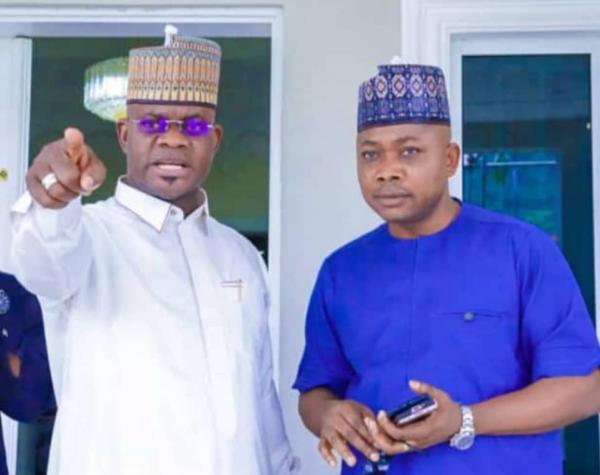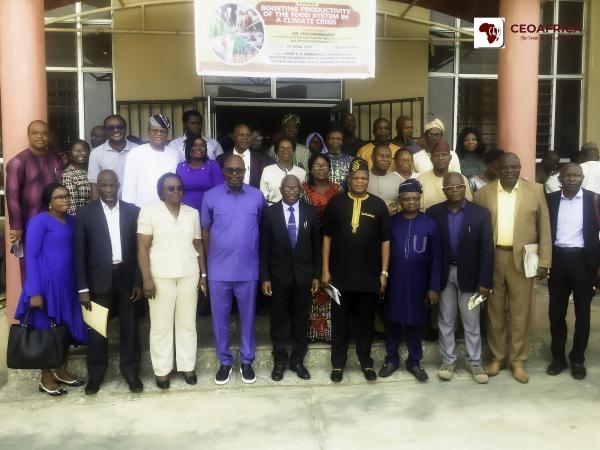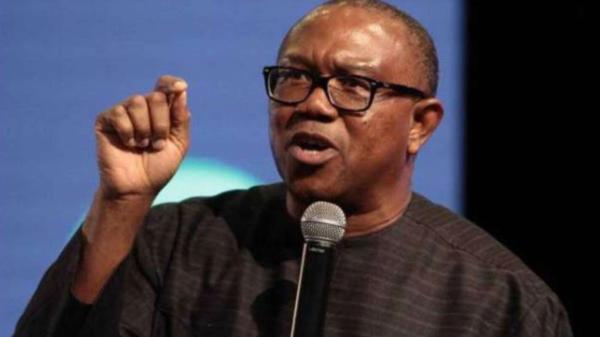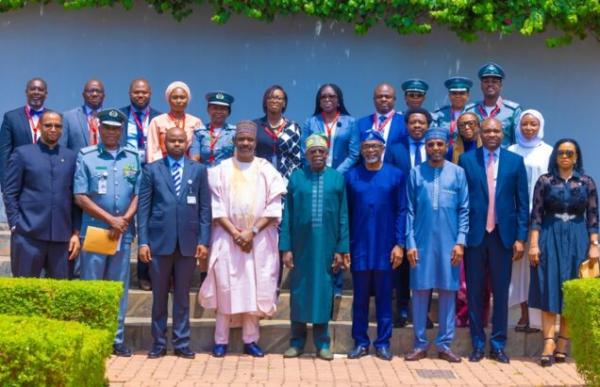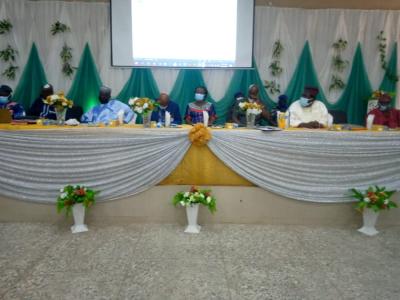
IBADAN-Wednesday April 28, 2021: Director General of Oyo State Agribusiness Development Agency (OYSADA), Dr. Debo Akande, has said agribusiness entrepreneurship remains the potential driver to Nigeria economy and poverty alleviation in the country.
The DG, who is a guest speaker at the Joint Annual Research Review and 33rd South-West Research Extension Farmers Input Linkage System (REFILS) organized by the Institute of Agricultural Research & Training (IAR&T) and REFILS Stakeholders, stated this on Monday, 26th April, 2021.
Akande, while speaking on the topic: “Agricultural Research and Entrepreneurship for Poverty Alleviation”, commended the research outputs of IAR&T.
He expressed that IAR&T, being one of the foremost National Agricultural Research Institutes in Nigeria, is living up to its mandate in enhancing farming systems and developing improved technologies and outstanding improved varieties of many common staples.
The guest speaker, however, lamented on the poverty rate in Nigeria, noting that despite the abundant resources available, they are not reflected on the development of the country.
He added that the contribution of agriculture to Nigerian’s economy was undermined after the independence with the discovery of Oil in 1973.
“During most of the periods that Nigerian’s economy was growing, the poverty level was still also high. Although poverty has continued to persist since the colonial era in Nigeria, things, however, did not get better even after independence.
“Distinguished academic, as you are aware before the independence of Nigeria in 1970, the economy of Nigeria was primarily driven by Agriculture; the contribution of agriculture to Nigerian’s economy was, however, undermined after the independence with the discovery of Oil in 1973.
“The oil sector took over as the primary contributor to the economic growth to the neglect of other sectors, he stated.
Akande asserted that agriculture is taking its position as an important contributor to the economy with a strong awareness of the entrepreneurship potentials in the agricultural sector, generally referred to as agribusiness.
He noted that through Agribusiness Nigeria could engage in a modern approach in agriculture to support high internal generated revenue and substitution of the increasing food importation bill of the country.
“Agribusiness entrepreneurship remains one of the most important potential drivers of the Nigerian economy and is closely related to poverty alleviation.
“Decades of policy reform, agricultural restructuring, and the growth of vertical integration within the food and agri-business industries have reshaped the sector greatly, unveiling its enormous potentials and creating a leeway in tackling the problem of poverty both in rural and urban areas.
“It is also expected that it will enhance the increased integration of the poor into the global value chain, as an essential component for poverty reduction,” he added.
The OYSADA’s DG affirmed that in this modern age, Agric can no longer be culture but a business, adding that the growth and the future of agricultural enterprises will depend essentially on its continuous adoption of modern agricultural practices across all the value chain, from “downstream, midstream and upstream; a practice that is to be built on innovations.”
Dr. Akande therefore tasked fellow researchers that they are not just to be producing academic papers for publication, but the content of publications should proffer solution to the needs in the world.
In her opening remarks, the Executive Director of the IAR&T, Professor Veronica Obatolu, highlighted the achievements of the research institute under her two-year leadership, among which is the latest discovery of the kenaf fibre in the production of Plaster of Paris, popularly known as POP ceiling.
The Executive Director also commended the South West Governors, most especially the Ogun State Government, for their supports to the institute.
Prof. Obatolu called on the Federal and State Governments to continue in their support for the Agricultural Institute, advising both levels of government to key into agribusiness as one of the ways to ensure growth in revenue generation and food security in the states and the country at large.
In an exclusive interview with CEOAFRICA, the Chief of Staff of Oyo State, Chief Luqman Oyebisi Ilaka, who represented the Executive Governor of the state, Engr. Seyi Makinde, at the Joint Annual Research Review, commended the performance of the Institute of Agricultural Research and Training (IAR&T) under the leadership of the Executive Director, Prof. Veronica Obatolu, assuring that current administration of the state will continue to collaborate with research institutes in improving food production and security in the state.
The Chief of Staff, who described the 5-day workshop as “a powerful course,” stated that the role the research institutes play in the state is enormous.
He added that all the innovative capacities need to be harnessed for the state to accelerate in the direction it is heading to, which is food security for the state.
Ilaka further stressed that there are lots of research institutes in the State and it is important there is collaboration between government and academia and by extension the private sectors.
“The state government is in collaboration with research institutes; we have a program in Awe which is directed to the youths. It is a kind of incubator for Agro entrepreneurs we are also starting up the accelerated Agric Development Scheme in this state as well. Again, by and large targeting young people and improving food production in the state.
Speaking on the topic: “Promoting Climate Smart Agriculture, Food Security and Sustainable Wealth Creation amidst COVID-19 and Social Conflicts”, Prof. Mohammed Kuta Yahaya, from the Department of Agricultural Extension & Rural Development, University of Ibadan, explained that the emergence of the deadly COVID-19 pandemic has adversely affected different countries in the world and at different scales.
He noted that different institutions have lost valuable and important personalities; some businesses have folded up due to restrictions in the movement of people and engagement in trans-border transactions, and some businesses are at the verge of folding up or have not been functioning optimally due to the deleterious effect of the pandemic.
He stressed that “Unless pragmatic and drastic measures are taken to cushion the effects of the pandemic, the ugly situation may worsen with attendant on long-time effects.”
Prof. Yahaya also reiterated the significant role of Agriculture in Nigeria’s Gross domestic product (GDP).
He disclosed that “Agriculture still accounts for nearly 40% of the country’s GDP.
“Country – specific observations from studies conducted in recent decade show that various parts of the country have already experienced the impacts of climate change, including accentuated droughts, severe floods and increased occurrence and intensity of storm surges, with concomitant flooding, coastal erosion, progressive salinization of fresh water aquifers and variability in the availability of fisheries resources.
“It is clear that climate change poses momentous threats to agricultural development, poverty reduction, food security and sustainable wealth creation especially in developing countries. These challenges are aggravated by recurring food price hike, leading to food crisis in many parts of Nigeria. High fossil and fertilizer prices, an increase in environmental degradation and competition for food and water all together compound the threats posed to agricultural development and sustainable wealth creation,” he added
The erudite Professor maintained that the key to sustainable agricultural growth is more efficient use of land, labour and other inputs through technological progress, social innovation and new business models.
He also recommended the need for a robust agricultural extension policy to drive the process of food security; changes in agricultural practices to improve soil fertility and enhance carbon sequestration as well as reducing of greenhouse gas emissions from agriculture among others.
Dignitaries present at the event are: The Honourable Minister of Agriculture, Sabo Nanono ably represented by Prof. Garba Sharubutu, the Executive Secretary of the Agricultural Research Council of Nigeria, ARCN; Executive Governor of Oyo State, Seyi Makinde ably represented by the Chief of Staff, Chief Bisi Ilaka; the executive Governor of Ogun State, Dapo Abiodun, ably represented by the honourable Commissioner of Agriculture, Dr. Adeola Odedina; the Vice Chancellor and the Chairman of the governing council of the Institute of Agricultural Research and Training, Obafemi Awolowo University, Prof Eyitope Ogunbodede; The Executive Director of IAR&T, Prof. Veronica Obatolu; Director General of National Centre for Genetic Resources and Biotechnology (NACGRAB), Dr. Sunday Oladele; The Provost of the College of Animal Health and Production Technology Ibadan, Dr Adekoya Owosibo; the Regional coordinator of the Federal Ministry of Agriculture and Natural Resources, Dr. Marcus Ogunbiyi; Permanent Secretary of the Ministry of Agriculture Ogun State, Dr. Dotun Soronke; the Executive Director of National Horticultural Research Institute (NIHORT), Dr Ademola A. Idowu; President of the Nigerian Institute of Soil Science, Prof. Okechukwu Chude, represented by Prof. James Adediran; the representative of Office Chérifien des Phosphates (OCP) Africa, Dr. Jonah Madukwe, among others.













